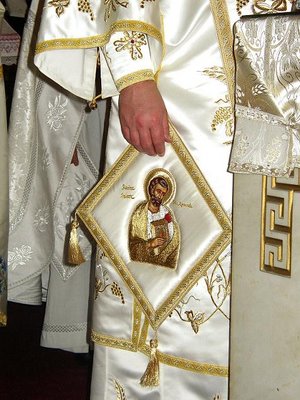Difference between revisions of "Epigonation"
| Line 12: | Line 12: | ||
[[Category:Vestments]] | [[Category:Vestments]] | ||
| + | [[el:Επιγονάτιο]] | ||
[[es:Epigonation]] | [[es:Epigonation]] | ||
Revision as of 16:34, February 23, 2008
The epigonation (from Greek, "upon the knee") is a stiff, diamond-shaped vestment worn on the right side by priests and bishops.
In the Byzantine tradition, the epigonation is awarded to a priest upon his elevation to exomologoumenos (confessor). In the Russian tradition, it is an award given after many years of service.
It represents a shield, originating from the thigh shield worn by soldiers during the days of the early church. The epigonation holds a dual meaning. First, it denotes the celebrant as a "soldier" of Christ. Second, it symbolizes the Word of God, fighting the wiles of the enemy. The epigonation is known as the palitsa in the Russian tradition.
This article or section is a stub (i.e., in need of additional material). You can help OrthodoxWiki by expanding it.
